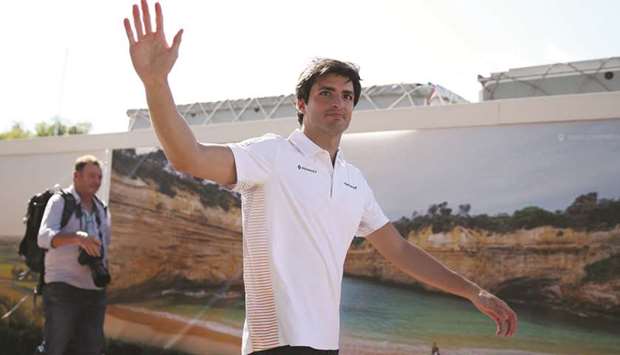Ferrari-bound Spanish driver Carlos Sainz has said he is determined to leave McLaren on a high at the end of the Formula One season. In an interview to Formula One website, the 25-year-old driver thanked team bosses for their understanding and not standing in the way of his move to Maranello.
“The moment I felt like there was an interest from Ferrari in hiring me for 2021, I went straight to (McLaren boss) Zak (Brown),” he said. “And he had a positive feedback in terms of ‘OK, this opportunity is coming to you, we’ll let you talk to Ferrari and let’s stay in touch to see how everything develops’. The key of this process has been the clarity and the openness of all parties involved to make it happen. That makes me incredibly proud, and the way it has all been managed makes me feel very happy and very thankful to Zak and his team,” added the Spaniard.
Sainz joined McLaren from Renault at the end of 2018, replacing double world champion Fernando Alonso, and took the team’s first podium since 2014 with third place in Brazil. He finished sixth overall in the 2019 championship, the highest driver from outside the top three teams, with McLaren ending the year fourth.
The move to Ferrari, replacing four times world champion Sebastian Vettel, was announced on May 14 and Sainz said McLaren, who have signed Australian Daniel Ricciardo, congratulated him. “They said: ‘You deserve it and I’m sure you will do great there’, and that confidence boost is always nice to hear from your bosses,” said the Spaniard. “There’s nothing that I would love more than saying goodbye to McLaren on a high.”
Formula One teams agree
cost-cutting measures: report
Formula One’s 10 teams have agreed cost-cutting measures including a budget cap of $145mn for 2021, the BBC reported. The measures have yet to be approved officially by the governing FIA’s World Motor Sport Council, by an e-vote due to the Covid-19 pandemic, but that is seen as a formality and likely next week.
Formula One’s managing director for motorsport Ross Brawn said this month that the $145mn figure had been agreed and the sport would look for further reductions in future seasons. The BBC and motorsport.com, citing multiple sources, said teams had agreed to reduce the cap to $140mn in 2022 and $135mn for the period 2023-25.
F1’s season has yet to start, with the first 10 races postponed or cancelled due to the pandemic. A major rewrite of the technical regulations has been delayed to 2022, with teams carrying over this year’s cars to 2021. The budget cap, which does not include driver salaries, had been set initially at $175mn but some teams had wanted a more drastic limit closer to $100mn to ensure the sport survives the crisis.
F1 drivers fully support ‘ghost races’, says GPDA head Wurz
Formula One drivers fully support plans to start the season with “ghost races” behind closed doors, according to Grand Prix Drivers’ Association (GPDA) chairman Alex Wurz. The sport aims to kick off a season delayed by the Covid-19 pandemic with two back-to-back races without spectators at Austria’s Red Bull Ring in July.
More races under similar conditions will then be held in Europe with the sport also hoping some races can happen in Asia, the Middle East and Americas. Wurz, an Austrian, told Sky Sports the drivers would rather race in front of a crowd but understood why that was not possible in such ‘strange times’.
“I think no one in motorsport, no driver, and personally me definitely not, is a fan of ‘ghost races’,” added the former Benetton and McLaren driver. “However all the drivers I have spoken to, and I’m constantly in talks with all of them, no one has said ‘No, I don’t want to do it’ or ‘I feel it’s the wrong thing to do’. Ghost races are a means to get us back on track earlier than if we wait for fan-attended races. Therefore we are looking for ghost races, and all the drivers accept fully.”
Formula One has so far seen three races cancelled, including the Monaco showcase that would have been this weekend, and seven postponed. The plan is for teams, mostly Britain-based, to travel to Austria on charter flights and not to come into contact with the local population.

Carlos Sainz
